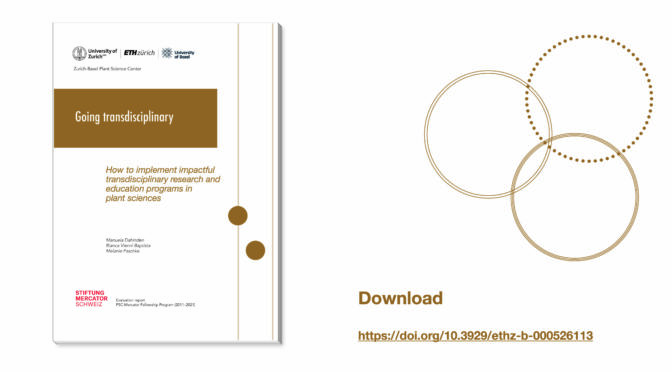Download evaluation report: PDF
The Zurich-Basel Plant Science Center finished 11 years of successful cooperation with the Mercator Foundation Switzerland. 8 fellows finished their theses and generated welcome inputs for policymaking in biodiversity, land use and agriculture, climate change in the alpine areas, applying a new barcoding tool to trace illegal logging of rosewood or international emission policies linked to deforestation.
In spring 2021 the PSC has set out to evaluate its long-term efforts in the PSC-Mercator Fellowship Program. PSC now published a best-practice report addressing two main questions: (i) How effective has been the competence-oriented transdisciplinary teaching? (ii) What worked well and what can be improved? The aim was to identify: (i) the impact of the PSC graduate fellowship programs, and (ii) the implementation measures that may improve future programs.
Recommendations 2021-2024:
Capacity building Offer training in transdisciplinary methods and tools for PIs, too (Fishbowl, PSC Retreat, 2021). Consider cross-departmental research and training programs that increase visibility and transdisciplinary research capacity (Interview 1, 2021).
Best practices and failing stories Provide “hands-on” examples of successful PhD projects to motivate students to experiment with transdisciplinary research. Stories of failures early on in the training process are also a useful resource (Interviews 1 & 2, 2021). Include formats for peer-learning at the very beginning of the fellowship program (Student, PSC Retreat, 2021).
Commitment and engagement Design the program together with the PI for him/her to fully commit to it from the beginning (Interviews 1 & 3, 2021). Transdisciplinary programs rely individual commitment and build on such relationships (Interviews 1 & 2, 2021). “Partners should define their responsibilities at the beginning of the project by mutual agreement” (Interview 2, 2021).
In-house advisor Allow time and resources for an “in-house advisor”. His/her role is to accompany the scientific and policy processes, while “helping the parties in their integrative efforts and mentoring. During the research process, this advisor will ensure that the participatory process is fair” (Interview 2, 2021).
Long-term institutional support Emphasize the need for continuous institutional support and reasonable time frames in view of coordinating and accompanying required for transdisciplinary processes.
References:
Dahinden, M., Vienni Baptista, B., Paschke, M. (2022). Going transdisciplinary. How to implement impactful transdisciplinary research and education programs in plant sciences. Evaluation Report. Zurich-Basel Plant Science Center: https://www.research-collection.ethz.ch/handle/20.500.11850/526113

